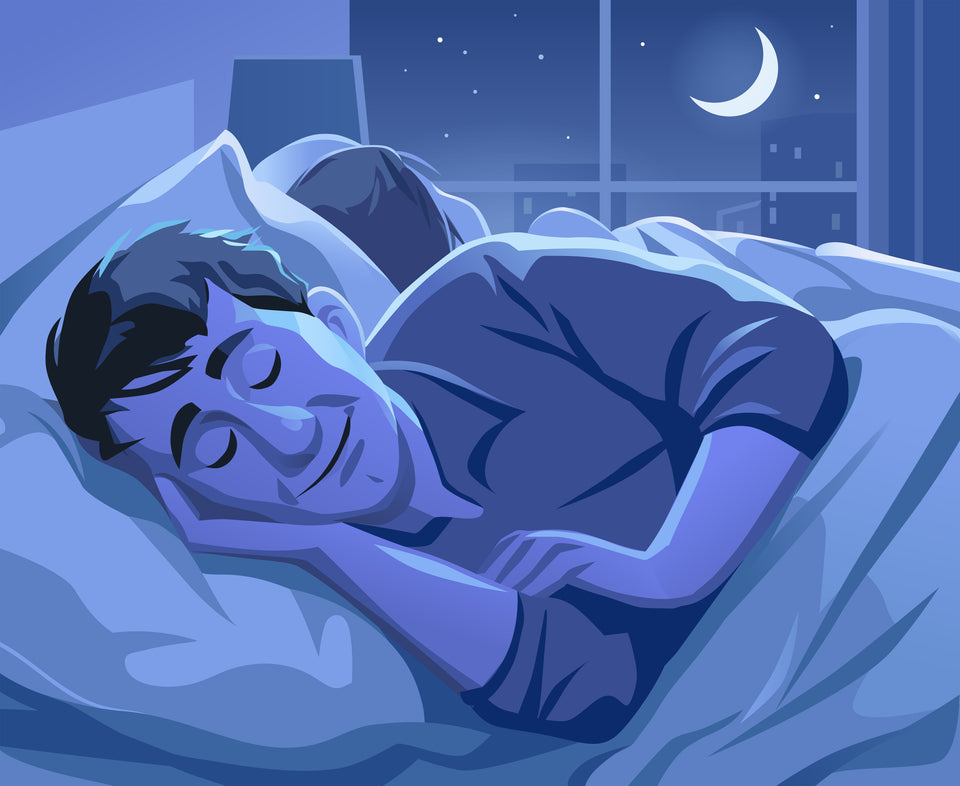Deep Sleep And Benefits of Deep Sleep
Are you waking up feeling more exhausted than when you went to bed? You’re not alone.
Deep sleep is often the missing piece in the puzzle of a restful night. This crucial phase of sleep is when your body truly recharges, repairing cells, boosting your immune system, and even consolidating memories. Imagine waking up feeling refreshed and ready to conquer your day.
Intrigued? Discover how you can unlock the secrets of deep sleep and transform your nights into a powerful tool for better health and vitality. Let’s explore how a deeper sleep can change your life, starting tonight.

Credit: sleeppsychiatrist.com
Benefits Of Deep Sleep
Deep sleep restores energy and strengthens the immune system. It improves memory and supports emotional balance. Quality deep sleep boosts overall health and productivity.
Deep sleep is more than just a restful night; it’s a crucial part of maintaining a healthy lifestyle. Many people underestimate the benefits of deep sleep, often sacrificing it for late-night activities or early morning routines. Yet, the advantages of embracing this stage of sleep are profound and can impact your physical and mental well-being. Understanding these benefits might just make you reconsider hitting the snooze button a few times.
Physical Recovery
When you enter deep sleep, your body engages in significant repair work. Muscles grow and tissues heal, making it essential for athletes or anyone engaged in physical activity. Imagine waking up without the usual aches and feeling rejuvenated; deep sleep can make this your reality. Deep sleep is like a natural performance enhancer. It helps improve athletic performance by aiding muscle recovery and growth. Next time you skip stretching before bed, think about how a few extra minutes of deep sleep could do wonders for your body.
Mental Restoration
Your mind needs a break as much as your body does. During deep sleep, your brain processes emotions and memories, helping you wake up mentally sharp. If you’ve ever noticed increased irritability or forgetfulness after a poor night’s sleep, deep sleep—or the lack of it—might be the culprit. Think of deep sleep as your brain’s reset button. It clears out the mental clutter accumulated during the day, enhancing cognitive function. Wouldn’t it be nice to tackle your to-do list with a clear and focused mind?
Immune System Boost
Deep sleep strengthens your body’s defense system. When you get enough deep sleep, your immune system is better equipped to fight off illnesses. Skimping on this crucial stage of sleep can make you more susceptible to colds and infections. Consider how often you fall sick during stressful times when sleep is compromised. Prioritizing deep sleep could be your simple, natural remedy to staying healthy. Isn’t it worth sacrificing a late-night binge for a stronger immune system? Understanding the benefits of deep sleep can transform how you approach your nightly routine. The next time you’re tempted to stay up late, remember the physical recovery, mental restoration, and immune boost that deep sleep offers. How will you prioritize deep sleep tonight?

Credit: www.healthywomen.org
Stages Of Sleep
Understanding the stages of sleep helps improve sleep quality. Sleep consists of several stages. Each stage plays a vital role in rest and recovery. The sleep cycle includes REM and non-REM phases. Delving deeper, we find the crucial deep sleep phase.
Rem Sleep
REM stands for Rapid Eye Movement. In this stage, eyes move rapidly beneath the eyelids. Dreaming occurs most often here. The brain is active, yet the body remains still. REM sleep supports learning and memory.
Non-rem Sleep
Non-REM sleep includes three distinct stages. The first stage involves light sleep. In this phase, you can easily wake up. The second stage sees a slowing heart rate and decreased temperature. The third stage is the transition to deep sleep.
Deep Sleep Phase
The deep sleep phase is also called slow-wave sleep. It is the most restorative sleep stage. During deep sleep, the body repairs tissues and builds muscles. Growth and development occur in this phase. Deep sleep strengthens the immune system.
Factors Affecting Deep Sleep
Deep sleep can be influenced by stress levels and sleeping environment. Consuming caffeine or alcohol disrupts sleep cycles. Regular exercise and a consistent sleep schedule can enhance deep sleep quality.
Deep sleep is crucial for rejuvenating your body and mind, helping you wake up refreshed and ready for the day. However, achieving deep sleep isn’t always easy. Several factors can interfere with this vital stage of rest, leaving you feeling drained instead of recharged. By understanding these factors, you can make adjustments to improve your sleep quality and overall well-being.
Stress Levels
Your mind races with thoughts at night, making it difficult to switch off and settle into a deep sleep. Stress can be a significant barrier, causing you to toss and turn instead of drifting off into restful slumber. Try incorporating relaxation techniques like meditation or deep breathing into your bedtime routine. These practices can help calm your mind and prepare your body for a peaceful night.
Dietary Habits
What you eat and drink before bed can significantly impact your ability to achieve deep sleep. Consuming caffeine or heavy meals late in the day can keep you awake when you should be resting. Opt for a light snack if you’re hungry at night, and limit your caffeine intake to earlier in the day. A warm herbal tea or a glass of milk can be soothing choices to signal your body it’s time to wind down.
Sleep Environment
Your bedroom should be a sanctuary for sleep, free of distractions and conducive to relaxation. A cluttered or noisy environment can hinder your ability to reach deep sleep stages. Ensure your room is dark, quiet, and cool, as these conditions are optimal for sleeping. Consider using blackout curtains, earplugs, or a white noise machine to enhance your sleep setting. Have you noticed how a small change in your environment or routine can make a big difference in your sleep quality? By addressing these factors, you can create a more restful night and a more energized tomorrow.
Improving Deep Sleep
Deep sleep plays a vital role in physical and mental health. It helps the body repair itself and strengthens the immune system. Many people struggle to achieve quality deep sleep. This affects their energy levels and mood. Fortunately, there are ways to improve deep sleep. Implementing simple changes can make a big difference.
Sleep Hygiene Practices
Maintaining good sleep hygiene ensures a restful night. Keep your bedroom dark and cool. Use blackout curtains to block light. Silence all electronic devices before bedtime. Avoid caffeine and heavy meals in the evening. They can disrupt sleep patterns. Establish a relaxing bedtime routine. This signals the body it’s time to wind down.
Relaxation Techniques
Relaxation techniques calm the mind and body. Deep breathing exercises reduce stress and tension. They prepare you for sleep. Meditation is another effective method. It helps clear the mind of worries. Listening to soothing music can promote relaxation. A warm bath before bed also aids relaxation. Try reading a book to ease into sleep.
Optimal Sleep Schedule
An optimal sleep schedule promotes consistent deep sleep. Go to bed and wake up at the same time daily. This regulates the body’s internal clock. Stick to this schedule even on weekends. Avoid naps longer than 20 minutes during the day. They can interfere with nighttime sleep. Monitor your sleep cycle for improvement.
Common Sleep Disorders
Sleep is a crucial part of maintaining good health and well-being. However, many people struggle with getting enough deep sleep due to common sleep disorders. These disorders not only disrupt your sleep cycle but can also negatively impact your daily life. Let’s explore some of the prevalent sleep disorders and how they affect your ability to achieve restful sleep.
Insomnia
Insomnia is a sleep disorder that makes it hard for you to fall asleep or stay asleep. You might find yourself tossing and turning for hours, staring at the ceiling. You wake up feeling tired, as if you didn’t sleep at all.
Stress, anxiety, and depression are common culprits behind insomnia. A noisy environment or uncomfortable bedding can also contribute. Have you noticed how a small change in your bedtime routine can sometimes make a big difference?
To combat insomnia, try establishing a calming bedtime ritual. Dim the lights, play soothing music, or read a book. Experiment with different methods to find what helps you relax the most.
Sleep Apnea
Sleep apnea is more than just snoring. It occurs when your breathing stops and starts repeatedly during sleep. You might wake up gasping for air, disrupting your deep sleep cycle.
It often goes unnoticed, but you might feel exhausted during the day despite spending enough hours in bed. If your partner complains about your loud snoring or pauses in breathing, it’s worth getting checked.
Continuous Positive Airway Pressure (CPAP) machines can help. These devices keep your airway open, ensuring you breathe consistently throughout the night. It’s a small change that can lead to significant improvement in sleep quality.
Restless Leg Syndrome
Restless Leg Syndrome (RLS) causes an overwhelming urge to move your legs while trying to rest. It can feel like a crawling or tingling sensation that’s impossible to ignore.
RLS can strike at any time, but it’s most disruptive at night when you’re trying to sleep. You might find yourself walking around the house to ease the discomfort.
Regular exercise and a healthy diet can alleviate symptoms. Stretching your legs before bed might also help. What changes have you made to tackle your restless nights?
Sleep disorders can seem daunting, but understanding them is the first step in overcoming their impact. By identifying your sleep challenges, you can take control and find solutions that work for you.
Technology And Sleep
Deep sleep is crucial for rejuvenating the body and mind. Technology, like blue light screens, often disrupts this essential sleep phase. Embracing tech-free bedtime routines can enhance deep sleep quality, promoting better health and well-being.
In today’s fast-paced world, technology has become an integral part of our lives, shaping everything from how we work to how we sleep. But, have you ever considered how your favorite gadgets might be affecting your rest? While technology offers many benefits, it can also be a double-edged sword when it comes to achieving deep sleep. Let’s dive into how our tech habits might be influencing our sleep quality and explore some practical ways to harness technology for better rest.
Impact Of Screens
Staring at screens before bedtime is a common habit. Whether it’s your smartphone, tablet, or TV, these devices emit blue light, which can interfere with your natural sleep cycle. Blue light tricks your brain into thinking it’s daytime, reducing the production of melatonin, the hormone responsible for sleepiness. To minimize this impact, consider setting a screen curfew. Try switching off devices at least an hour before sleep. If this seems challenging, use night mode settings or blue light filter apps on your devices.
Sleep Tracking Devices
Curious about how well you sleep? Sleep tracking devices can give you insights into your sleep patterns. These gadgets range from smartwatches to specialized sleep trackers that monitor your sleep stages, duration, and even disturbances. For instance, you might discover that you wake up several times during the night. Armed with this knowledge, you can make changes to your sleep environment or routine. These insights can be a game-changer in improving your sleep quality. However, remember not to obsess over the data. Use it as a guide to identify patterns and make informed decisions.
Apps For Better Sleep
There are countless apps designed to help you sleep better. From guided meditation to white noise generators, these apps aim to create a calming environment conducive to sleep. Imagine winding down with a soothing meditation session that eases your mind. Or, use a white noise app that drowns out disruptive sounds, making your bedroom a serene haven. Experiment with different apps to find what works best for you. But, ensure your phone is set to “do not disturb” mode to prevent notifications from breaking your sleep. Technology can be a powerful ally in improving sleep, but it requires mindful use. How will you adjust your tech habits to achieve the deep, restful sleep you deserve?
Deep Sleep Myths
Many believe deep sleep means sleeping longer, but it’s the quality that counts. Deep sleep restores body and mind. Common myths mislead, affecting sleep habits and health.
Deep sleep is often shrouded in mystery, with many myths making it even more confusing. People toss around ideas about how much sleep you need, how age affects sleep, and whether sleep meds are a good idea. These myths can lead you astray and disrupt your sleep routine. Let’s debunk some of these common misconceptions.
Sleep Duration Misconceptions
Many believe that everyone needs eight hours of sleep to function well. However, sleep needs vary from person to person. Some thrive on seven hours, while others need nine. When I was a student, I used to think I needed to sleep exactly eight hours. This rigid thinking often stressed me out, leading to worse sleep. The key is to listen to your body and find the sleep duration that makes you feel rested. Have you ever woken up after seven hours feeling refreshed? Then maybe that’s your sweet spot.
Age-related Sleep Changes
There’s a common belief that as you age, you need less sleep. While older adults might have more fragmented sleep, their need for deep sleep doesn’t necessarily decrease. Quality sleep remains crucial for all age groups. My grandmother often complained of waking up multiple times at night. She thought it was normal for her age. After adjusting her bedtime routine, she found deeper sleep and felt more energetic. Have you noticed changes in your sleep pattern as you’ve aged? It might be time to review your sleep habits rather than accept it as an age inevitability.
Sleep Medication Myths
Many think sleep medications are a quick fix for sleep problems. While they can be helpful in the short term, they aren’t a sustainable solution. Over-reliance can lead to dependency and disrupt natural sleep cycles. I once tried using sleep aids during a stressful week at work. Initially, they helped, but soon I found myself struggling to sleep without them. Learning relaxation techniques proved more effective in the long run. Do you rely on medications to get your sleep? Consider exploring natural alternatives that promote better sleep hygiene. Challenging these myths can lead you to a deeper understanding of your sleep needs. What changes will you make today to improve your sleep?

Credit: www.naturemade.com
Frequently Asked Questions
What Is Deep Sleep?
Deep sleep, also known as slow-wave sleep, is a crucial stage of the sleep cycle. During deep sleep, the body repairs itself and strengthens the immune system. It is essential for physical health, cognitive function, and overall well-being. Achieving adequate deep sleep helps improve memory and mood.
How Can I Improve Deep Sleep?
To improve deep sleep, maintain a consistent sleep schedule and create a relaxing bedtime routine. Avoid caffeine and electronic devices before bed. A comfortable sleep environment, such as a dark, cool room, can also promote deeper sleep. Regular physical activity and stress management techniques can further enhance deep sleep quality.
Why Is Deep Sleep Important?
Deep sleep is vital for physical health and cognitive function. It helps in muscle recovery, tissue growth, and immune system strengthening. During this stage, the brain processes information and consolidates memories. Adequate deep sleep enhances mood, reduces stress, and supports overall mental health, making it essential for daily life.
How Much Deep Sleep Do I Need?
Adults typically need 1. 5 to 2 hours of deep sleep per night. This amount varies based on age, lifestyle, and individual needs. Prioritizing overall sleep quality and maintaining a consistent sleep schedule can help achieve the necessary amount of deep sleep for optimal health and well-being.
Conclusion
Discovering ways to enhance deep sleep can transform your nights. Better rest leads to improved mood and energy. Simple changes can make a big difference. Create a sleep-friendly environment. Limit screen time before bed. Establish a consistent sleep schedule. Prioritize relaxation and mindfulness.
These strategies support healthier sleep patterns. Experiment with techniques to find what works. Embrace the journey to better sleep. Your body and mind will thank you. Sleep well, live well.
